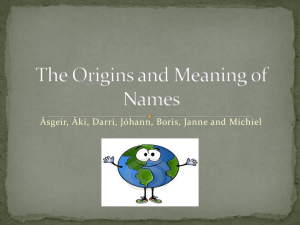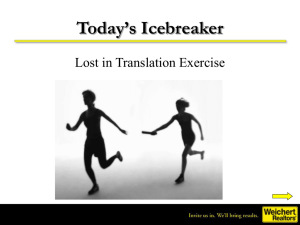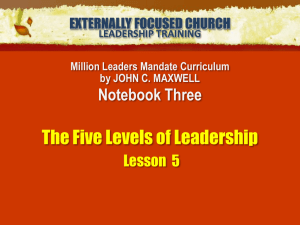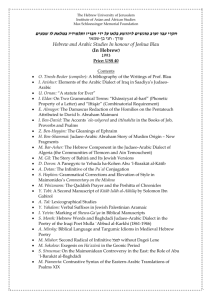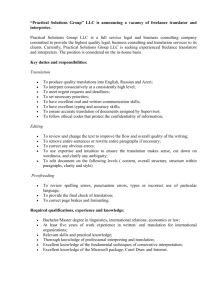Fall 2010_Mistranslation
advertisement
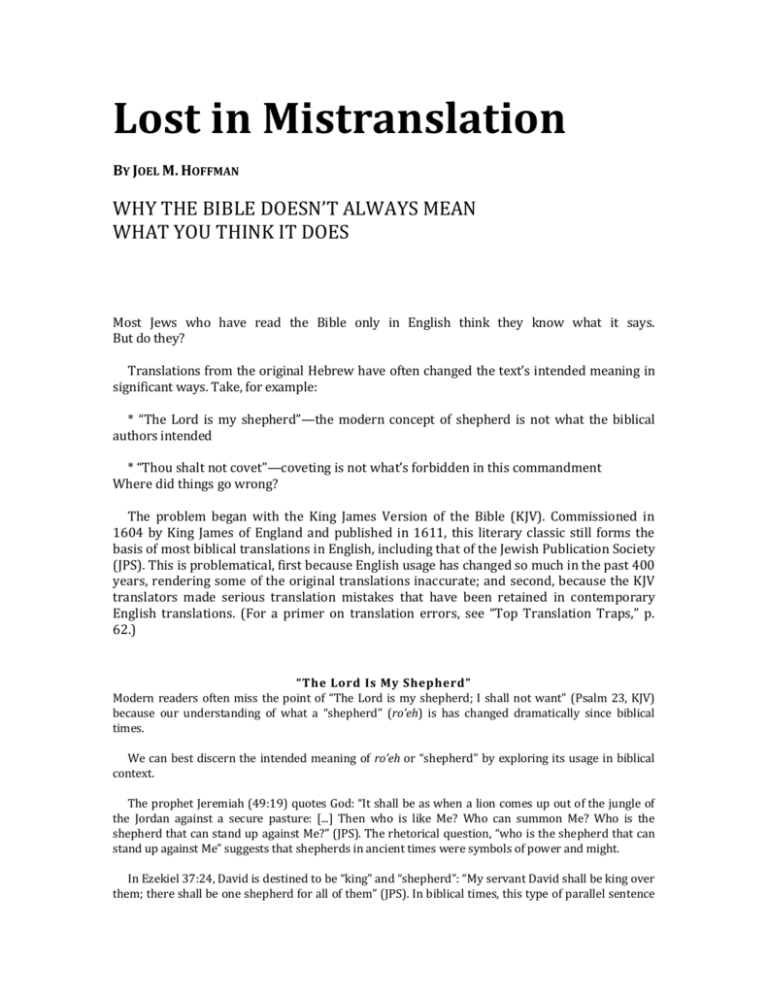
Lost in Mistranslation BY JOEL M. HOFFMAN WHY THE BIBLE DOESN’T ALWAYS MEAN WHAT YOU THINK IT DOES Most Jews who have read the Bible only in English think they know what it says. But do they? Translations from the original Hebrew have often changed the text’s intended meaning in significant ways. Take, for example: * “The Lord is my shepherd”—the modern concept of shepherd is not what the biblical authors intended * “Thou shalt not covet”—coveting is not what’s forbidden in this commandment Where did things go wrong? The problem began with the King James Version of the Bible (KJV). Commissioned in 1604 by King James of England and published in 1611, this literary classic still forms the basis of most biblical translations in English, including that of the Jewish Publication Society (JPS). This is problematical, first because English usage has changed so much in the past 400 years, rendering some of the original translations inaccurate; and second, because the KJV translators made serious translation mistakes that have been retained in contemporary English translations. (For a primer on translation errors, see “Top Translation Traps,” p. 62.) “The Lord Is My Shepherd” Modern readers often miss the point of “The Lord is my shepherd; I shall not want” (Psalm 23, KJV) because our understanding of what a “shepherd” (ro’eh) is has changed dramatically since biblical times. We can best discern the intended meaning of ro’eh or “shepherd” by exploring its usage in biblical context. The prophet Jeremiah (49:19) quotes God: “It shall be as when a lion comes up out of the jungle of the Jordan against a secure pasture: [...] Then who is like Me? Who can summon Me? Who is the shepherd that can stand up against Me?” (JPS). The rhetorical question, “who is the shepherd that can stand up against Me” suggests that shepherds in ancient times were symbols of power and might. In Ezekiel 37:24, David is destined to be “king” and “shepherd”: “My servant David shall be king over them; there shall be one shepherd for all of them” (JPS). In biblical times, this type of parallel sentence construction was often used to accentuate a single idea, so “king” and “shepherd” in this passage probably had similar, royal-laden meanings. In Song of Songs 2:16, “My lover is mine and I am his” ends with two words that describe “my lover”: haro’eh bashoshanim, “[the one] who is a shepherd among flowers.” Here a shepherd takes on a romantic persona. A picture emerges of shepherds as being fierce, powerful, royal, and romantic. In addition, as tenders of livestock, shepherds were responsible for providing sustenance, care, and defense. Looking at these attributes as a whole, we see that the biblical shepherd was a brave, strong, regal protector of the weak, providing safety, food, and tranquility—quite unlike our associations of a modern “shepherd” as a marginalized loner for whom gentleness is more important than power. In short, the biblical shepherd was a “hero.” By substituting “hero” for “shepherd,” we can make sense of the rest of the Psalm. “The Lord is my hero; I shall not want.” In other words, since God—like a ro’eh—is powerful enough to provide protection, guidance, and security, I’ll have nothing to worry about. Revisiting Deuteronomy & the V’ahavta If you’ve attended Shabbat services, you probably know this injunction: “Love the Lord your God with all your heart [levav], and with all your soul [nefesh], and with all your might [me’od]” (JPS). These words from Deuteronomy 6:5, part of the V’ahavta prayer following the Shema in our service, constitute a pillar of our faith—and, as such, are affixed to our doorways in the parchment encased in mezuzot, and also contained in tefillin. But the Hebrew words levav and nefesh do not really mean “heart” and “soul.” Those are mistranslations. How do we know this? The most reliable way to detect and rectify mistranslation in an ancient and now unused language (remember: modern Hebrew is very different than biblical Hebrew) is to look at how ancient words were used in context. Let’s begin by probing the real meaning of levav. Deuteronomy 7:17 addresses what happens if you “say in your levav” that certain nations are too powerful to dispossess. In this context, “heart” seems a dubious translation for levav, because thinking is involved, and in English thought doesn’t take place in the “heart” but in the “mind.” A similar conclusion can be drawn from two passages in Isaiah: “...let them see with their eyes, hear with their ears, and understand with their levav” (6:10) and “His levav does not think this way” (10:7). In both places, levav seems the locus of rational thought—“mind” in English. But in another passage from Isaiah, levav does seem to refer to the source of our emotions. When relating David’s profound sorrow at hearing that Ephraim has joined Syria in attacking Jerusalem, Isaiah notes that David suffers in his levav (7:2). Here and elsewhere, “heart” seems more appropriate for levav. So, which translation is correct—“mind” or “heart”? It is not an either/or question. Whereas modern American culture tends to differentiate rational thought from emotions, placing one in the mind and one in the heart, the ancients saw thinking and feeling as connected and residing in the same domain— namely, the levav. Translating levav as “heart” in the V’ahavta misses half of its biblical meaning! Next we turn to nefesh, commonly (but wrongly) translated as “soul.” Genesis 14 relates the ongoing battle of four kings against five near Sodom and Gomorrah. After Lot gets captured, his uncle Abram (later Abraham) successfully rescues him, capturing other people and objects along the way. The king of Sodom offers a deal to Abram: “Give me the n’fashot, and take the possessions for yourself” (JPS, 14:21). Here, the word n’fashot (plural of nefesh) almost certainly refers to the physical body—“persons” or “people”—and, indeed, that is how JPS translates it. Leviticus 7:18, which is in part a guide to how long meat can be kept before it rots, warns against the eating of sacrificial meat after the second day, cautioning that the “nefesh that eats it” will be guilty of an offense against the Lord. Here, again, nefesh cannot mean “soul,” because in English the “soul” is not what does the eating. A more apt translation here is “person.” In Leviticus 17:11, nefesh appears to be related to blood: “For the nefesh of the flesh is in the blood” (JPS). Neither “soul” nor “person” works as a translation. I Kings 17:17-22 gives us another crucial bit of evidence. While fleeing King Ahab, Elijah finds himself in the house of a widow whose son was so sick that “there was no breath [n’shama—a different Hebrew word] left in him.” Elijah revives the dead boy by laying him down and stretching himself over the boy. Then “the child’s nefesh returned to his body, and he revived” (JPS). This is almost certainly an ancient case of mouth-to-mouth resuscitation. Here, nefesh appears to relate to “breath.” After all, the boy had no breath, Elijah blew into his mouth, and then the boy had a nefesh again. We now know that the nefesh is connected to “physical body,” to “blood,” and to “breath.” Nefesh, in short, is about the tangible aspects of life we can touch or feel. One can hold flesh, touch blood, and feel breath. This is why “soul” is a particularly poor translation of nefesh. In English, “soul” almost always emphasizes the untouchable, ethereal, amorphous aspects of life. The physical nefesh is just the opposite. Now we can look at nefesh and levav as they were used together. We have seen that levav represented thoughts and emotions—everything about life that cannot be touched—while nefesh, its counterpart, referred to everything in life we can touch. In other words, the biblical view was that our lives have two parts: our physical side (nefesh) and our harder-to-define, impossible-to-see, nonphysical side (levav). Returning to the V’ahavta: Unlike the usual English translation, which limits the commandment to love God with our “heart” and “soul,” the biblical commandment includes our minds, emotions, and our physical bodies. We now understand that we must love God with everything about us that makes us human. In the past few decades we have witnessed increasing interest in the “mind-body” connection which “levav and nefesh” together represent. So when doctors and researchers highlight this relationship, they are reaffirming what our biblical authors knew 3,000 years ago. “Thou Shalt Not Kill” Perhaps more than any other part of the Bible, the Decalogue has shaped Western culture. Yet two of the commandments have been significantly mistranslated. The sixth commandment, “lo tirtsach,” is translated in the KJV as “Thou shalt not kill” (Exodus 20:13). This verb, which comes from ratsach, is not the only Hebrew verb to refer to killing in the Bible. When Cain kills Abel in Genesis 4:8, the verb is harag. When Abraham pleads with God not to kill the people of Sodom in Genesis 18:25, the verb is heimit. And when Moses kills the Egyptian taskmaster in Exodus 2:12, the verb is hikah. Ratsach, in contrast, appears almost exclusively in the Ten Commandments and in the legalistic discussions concerning the cities of refuge, which were essentially biblical jails without the need for bars or guards. The Book of Numbers teaches that if a person is killed, a “blood redeemer”—usually one of the victim’s relatives—can kill the killer. The original killer, however, could flee to a city of refuge, where he would be beyond the reach of the blood redeemer until the community could afford the original killer due process. What can we discover about ratsach from this context? In Numbers 35:16 we learn that “Anyone…who strikes [hikah] another with an iron object so that death results is a murderer [ratsach]; the murderer [ratsach] shall be put to death [heimit]” (JPS). In fact, in all instances where ratsach is used, it indicates illegal killings requiring punishment. That includes cases of what we would now call manslaughter (although what was lawful 3,000 years ago doesn’t exactly match modern legal codes). In contrast, Numbers 35:19 instructs the blood redeemer to kill (heimit) the killer. The verb heimit— not ratsach—is used for the blood redeemer’s legally sanctioned killing. In short, in the contexts outside the Ten Commandments, ratsach refers only to illegal killing that demands punishment. That is why in the Ten Commandments, it is a mistake to translate lo tirtsach as “Thou shalt not kill” (KJV). Even “You shall not murder” (JPS) is inaccurate, because ratsach encompassed instances of manslaughter and other forms of illegal killing. In today’s world, soldiers or police officers who kill people while lawfully fulfilling their duty would not be violating the sixth commandment, but murderers and manslaughterers would be, because in essence the commandment is telling us: “Don’t break the law and kill.” “Thou Shalt Not Covet.” If you accept the translation of the tenth commandment as “Thou shalt not covet thy neighbor’s wife” (Exodus 20:17, KJV), you have been misled. The original Hebrew word chamad does not mean “covet,” “desire,” “want,” “crave,” or “lust.” Consider how chamad is used in Exodus 34:24, where God promises that “no one will chamad your land when you go up [to Jerusalem] to appear before your God three times a year” (JPS). Here “covet” is not a reasonable translation of chamad. Other people could desire the land whether or not the landowners were present. Rather, the landowners might have reasonably feared that people would take their land during their pilgrimage. Chamad must be a kind of taking. Retranslating chamad as “take” rather than “covet” solves another problem. Each of the other nine commandments stipulates which actions are right and wrong. Honoring parents is right. Killing (when breaking the law), stealing, and falsely testifying are wrong. Coveting—an expression of emotion, not action—does not fit with the other decrees. Taking does. The Ten Commandments thus reinforce the Jewish emphasis on actions. What we do—not what we feel—is what’s important. In these and many other ways, antiquated mistranslations have misled modern readers about some of the most significant messages and meanings in the world’s all-time best seller. “If you accept the translation of the tenth commandment as ‘Thou shalt not covet thy neighbor’s wife,’ you have been misled.” Dr. Joel M. Hoffman is chief translator for the 10-volume series, My People’s Prayerbook (Jewish Lights Publishing, 19972007) and author of In The Beginning: A Short History of the Hebrew Language (NYU Press, 2004) as well as And God Said: How Translations Conceal the Bible’s Original Meaning (Thomas Dunne Books, 2010), upon which this article is based. He has taught at Brandeis University and HUC-JIR in New York; he also moderates a blog on Bible translation (www.GodDidntSayThat.com). PAGES 26, 27, 29:: BERNARDO STROZZI/THE BRIDGEMAN ART LIBRARY/GETTY IMAGES; ARTE & IMMAGINI SRL/CORBIS Top Translation Traps # 1 Older Words, New Meanings English of the 21st century differs markedly from that of the early 17th century. Distortions occur when older words take on new meanings. For example: “The God of my mercy shall prevent me” (Psalm 59:10, KJV). “Prevent” used to mean “go before,” so the phrase meant, “God ... will walk before me.” “I shall not want” (Psalm 23:1, KJV). At that time “want” meant “lack,” so “I will lack nothing” is the real point of the statement. “To have respect of persons is not good” (Proverbs 28:21, KJV). “Respect” used to mean “to favor someone” or to be partial; the point was to avoid favoritism. # 2 Faulty Register Register is how linguists distinguish formal from informal language. As an example, imagine a waiter asking you about coffee in a formal restaurant (“Did you want coffee?”), a family restaurant (“Would you like coffee?”), and in a diner (“Want coffee?” or just “Coffee?”). When translating the Bible, the KJV authors chose what to them was modern but to us appears as a lofty, archaic form of English. Four hundred years ago, saying “I shall” was standard; “I will” was used only for emphasis. The word “thou” was intimate, sometimes used in contrast to “ye.” Verbs like “goest” were commonplace. In short, a question like “Who told thee that thou wast naked?” (Genesis 3:11) in the original English and Hebrew was no more formal than “Who told you that you were naked?” The problem with most English translators is that they force the entire biblical text into a single mode or register, ignoring the fact that the story-laden prose of Genesis is different than the legalistic prose of Leviticus and the narrative prose of Kings. Doing so is the equivalent of stringing The New York Times, Shakespeare, and Beatles lyrics together in one voice. In the KJV, the entire Bible now sounds archaic; the New Living Translation (1996) is thoroughly chatty; and both the New Revised Standard Version (1989) and Jewish Publication Society (1962) tend toward colloquial throughout. The failure to acknowledge register distinctions in translations can mask the meaning of the text. For example, consider the following passage: “And the Lord spake unto Moses, saying, Avenge the children of Israel of the Midianites: afterward shalt thou be gathered unto thy people. And Moses spake unto the people, saying, Arm some of yourselves unto the war, and let them go against the Midianites, and avenge the Lord of Midian” (KJV, Numbers 31:1-3). A more accurate translation would be simple and direct: “Adonai said to Moses, ‘Avenge the people of Israel on the Midianites; then you will die.’ And Moses said to the nation, ‘Choose men and form an army, and let them avenge God on Midian.’” Readers who focus too closely on the loftiness of the language often find it difficult to ascertain a key point of this passage: to show that Moses changed God’s command. God tells Moses, “Avenge the people of Israel on Midian,” while Moses tells the people, “Avenge God on Midian.” # 3 Older Words, New Meanings This error occurs when a translation of a Hebrew word that seems to make the most sense in one passage is applied to other passages, rather than the translator looking at all of the contexts of the word to arrive at the best definition. We saw the consequences of this error in “Thou shalt love the Lord your God with all your heart, all your soul, and all your might.” # 4 Missing the Point The American expression “out of sight, out of mind” sounds as if it might be paraphrased as “blind idiot,” but of course it cannot—which is why translation involves much more than looking at a word or group of words in isolation. That same “blind idiot” error occurred when Laura Esquivel’s book, originally titled Como agua para chocolate, was translated into English as a book and later a movie. Como means “like,” agua is “water,” para is “for,” and chocolate is “chocolate.” Accordingly, the English-language renditions of both book and movie became Like Water for Chocolate. In Spanish, “like water for chocolate” is a common expression based on the Spanish culinary tradition of preparing hot chocolate with water that is about to boil. In this context, “water for [making hot] chocolate” refers to water “at the boiling point,” as we might say in English. This understanding is consistent with the tension-filled story of a woman who cannot marry the man she wants because, as the youngest daughter, she must care for her mother. So while the translation “like water for chocolate” gets all of the words right in English, in the end it completely misses the point. Esquivel’s Spanish title foreshadows the internal tensions of her characters. Even though the English translation gets all of the words right, it’s not a good translation: It foreshadows nothing. A similar example of getting the words right but the meaning wrong can be found in Numbers 31:2—“Avenge the Israelite people on the Midianites: then you shall be gathered to your kin.” The Hebrew phrase ne’esaf el amav, or “gathered to his people,” means “died.” But JPS translates the line literally as “you [Moses] shall be gathered to your kin,” leaving the English reader unaware that death is involved. It’s as if someone defined the English phrase “kicked the bucket” as “hit the pail with his leg.” Knowing what the Hebrew words mean is generally only the first half of translating the Bible. The second and sometimes more difficult half is finding English words that mean the same thing as the original Hebrew.


